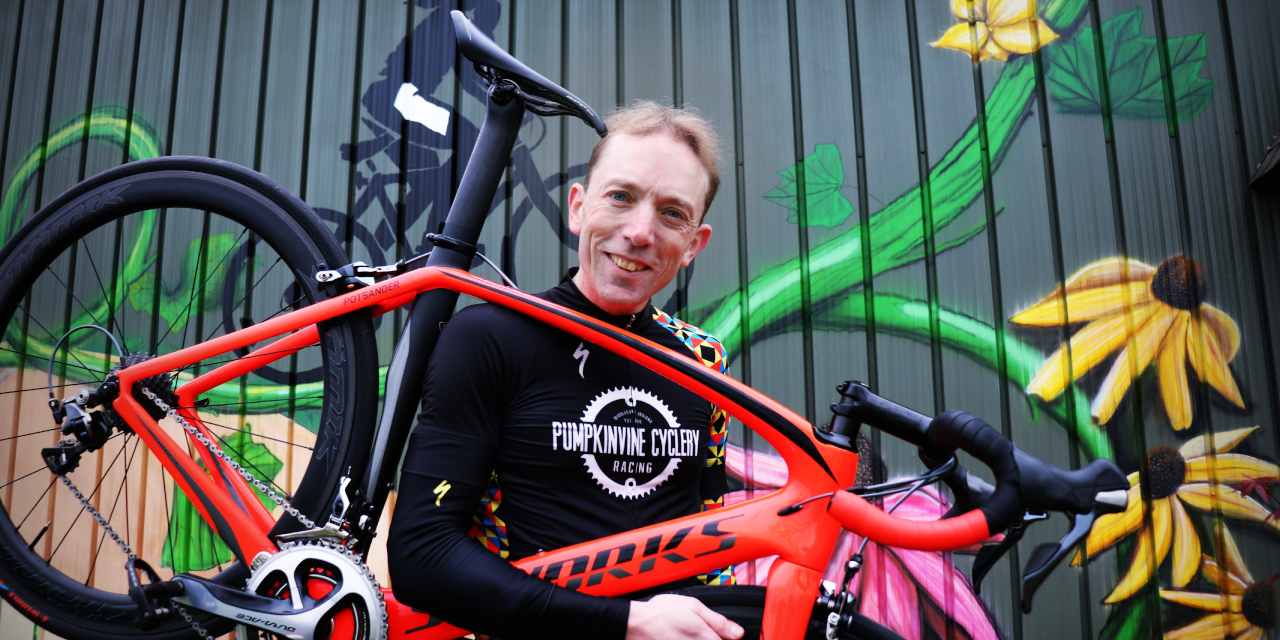Jason Potsander lives to inspire. Since graduating from Goshen College in 2001, he has dealt with many setbacks in his life – including 17 cycles of chemotherapy for stage IV pancreatic cancer – but none have stopped him from pursuing his goals, which include a different kind of cycle.
When he is not teaching his elementary school students or spending time with his family, he is training for bicycle races.“On one hand, cancer did not affect my life at all,” he said. “I kept doing all the good things I love and value, despite any circumstances, feelings, or side-effects from chemo. However, cancer did help accentuate my passions for life, namely, family and bicycling. I resolved even more strongly to give 100% in the things I put effort into in my life, no matter how I feel.”
For Potsander, bicycling has become one of his outlets and a way to show himself and the world that he can’t be stopped.
And he hasn’t been.
Potsander recently took on his version of Mount Everest in the midst of his twelfth chemotherapy cycle in June.
Though he didn’t visit the Himalayas, he participated in “Everesting” – an extreme feat that is gaining popularity in the cycling community as one of the most difficult of challenges.
To “everest” is “fiendishly simple, yet brutally hard. Everesting is the most difficult climbing challenge in the world.”
In order to complete the challenge, riders must choose a hill anywhere in the world, and in one continuous activity ride up and down until they accumulate the altitude of Mount Everest’s peak, which is just over 29,000 feet.
Few can complete the trip that is equal to vertically biking five miles into the sky. To date, less than 7,000 people in the world have completed the endurance challenge.
One of Potsander’s philosophies is “You have to either laugh or cry … you have to either stand up and fight or cower in fear. I choose to laugh and fight and make memories along the way.”
But June 27 will be a day he always remembers. Along with a few friends, Potsander found a hill along Route 22 in Onekama, Michigan, and set off to make his Everest attempt.
By the time the sun peaked out from the horizon the crew had already made their way up and down the two-kilometer stretch of hill a few times. To reach their goal of 29,029 feet, they would need to ride up the hill 86 times.
As the day went on, the sun blistered down on the riders.
One of the riders, Rob Martin, recorded the expedition on video. He said that despite the compounding exhaustion of hours of cycling, Potsander kept “plugging along.”
After 16 hours, Martin, a rider who routinely places in the top three in elite class mountain bike races, decided to call it quits on his attempt. Potsander wasn’t ready to stop plugging along.
Potsander was “full of fire, determination and strength,” Martin said.
Day turned into night, and they were still repeating that hill. Potsander recalls that the miles
between 11 p.m. and 2 a.m. “were the most soul searching, heartfelt, and SLOWEST miles I’d ever pedaled.”
Seventeen hours into the ride, spiders made nests on their bikes. The nests managed to “stay intact during the whole grinding ascent and screaming 35 mph descents,” which, to Potsander, “sounded like an analogy of tenacity: the humble little spider.”
He believes that a reward follows: “The external craft of bicycling is really just a microcosm of life in which I master the internal craft of self and become a better person.”
After over 21 hours of riding the same hill time and time again, Potsander reached the symbolic summit of Mount Everest. He had climbed 29,029 feet over the course of a 238-mile ride.
“[Potsander] is the toughest person that I know on the planet,” Martin said.
Since that day, Potsander has continued training and competing.
In September, he set a course record in the Melting Mann gravel race, a 24-mile bike race in Vandalia, Michigan.
Last winter, the Goshen College cross country team named an award after Potsander.
What was once “The GCXC Heart Award” now carries the title “The Jason Potsander Character Award” to shine a light on his example of work ethic and optimism.
Potsander plans to continue reaching his goals and then set new ones. It is his mentality with racing and with life.
“Statistically, 3-5% of those with stage IV pancreatic cancer live five years after diagnosis and I’ve set my goal to be one of them,” he said. “When I meet that goal, I’ll instantly ‘move the goal post’ and set my goal for another five years.”




